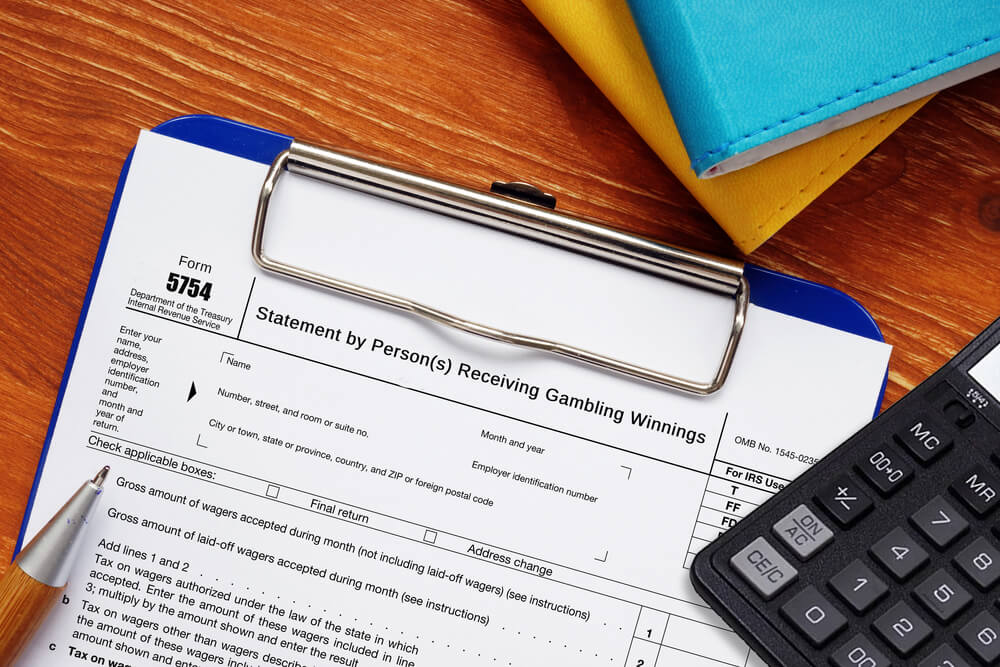

One of the most frequently asked questions we get from New Jersey players is “what happens if I don’t report my gambling winnings?” It’s a reasonable question to ask, for good reason. Just like your wages and freelance earnings, most big gambling wins are considered taxable income, and it’s your responsibility as a gambler to report them to the IRS and state taxman.
In this explainer article, we shall provide a quick rundown of what you need to know about reporting your gambling winnings in New Jersey. We’ll cover your gambling tax obligations, what will happen if you don’t report your winnings, and much more in between.
What we cover
What You Need to Know About Your Gambling Tax Obligations in New Jersey
If lady luck dances in your favor and you win some money from gambling, don’t forget that the Garden State taxman and Uncle Sam want their cut of the win, too. This is a reality for winnings made at both NJ online gambling sites, as well as land-based casinos in Atlantic City and elsewhere within the borders of New Jersey.
So, before you dash out and spend your windfall, here are key things you need to keep in mind about taxes on gambling losses and winnings. If you’re among NJ players asking “what happens if I don’t report my gambling winnings,” keep reading for the answer and more.
1) Gambling winnings are taxable in New Jersey
Are gambling winnings taxable in the Garden State? The answer is a resounding, yes – gambling winnings that meet a certain threshold are regarded as taxable and must be declared to the taxman. This applies to what you win while betting on sports, playing poker, slots, pari-mutuel racing, horse/dog racing, DFS, and other casino games.
The withholding rate from gambling winnings in New Jersey is set at 3% of the net payout for both non-residents and residents of the state, according to the Casino Control Act (N.J.S.A. 54A:5.1(g)). The minimum taxable amount and the actual rate of tax withholding vary from one gambling option to the next.
Tax withholding from lottery winnings: The tax withholding rate from winnings made on lottery gambling is usually calculated based on the amount of the prize payout. All lottery winnings that exceed $10,000 are subject to a state tax in New Jersey. The whole amount of your winnings is taxable and not just the payout above $10,000.
If your lottery jackpot payout is less than $10,000, you won’t have to pay withholding tax on it, but you might want to include it when filing returns. All lottery payouts from $10,001 up to $500,000 will be taxed at the rate of 5 percent. On the other hand, all lottery winnings exceeding $0.5 million are taxed at the withholding rate of 8 percent.
If the winner of any lottery payout exceeding $10,000 doesn’t produce a valid taxpayer Identification Number (EIN), the winnings will be taxed at 8 percent. It’s worth noting that the tax withholding is based on the total lottery payout. For instance, if three people win the state lottery prize of $18,000 and divide the payout equally, then the payout to each winner (i.e. $6,000) is subject to a 5 percent withholding rate.
To be more precise, all three winners would pay an income tax at the withholding rate of 5 percent because the total prize money won exceeds $10,000. Another important thing to heed is that New Jersey allows lottery winners to donate, split, and/or assign winnings to a charity or someone else. If you do so, the value of proceeds donated, split, or assigned to a charity is taxable to the receiving taxpayer based on the withholding rates mentioned above.
Income tax withholding from casino winnings: All taxable casino gambling winnings are subject to a 3% withholding rate. This applies to:
- All winnings exceeding $1,200 from bingo, video poker, table games, and slot machines
- All winnings exceeding $1,500 from keno games
- All poker winnings over $5,000, include poker tournament payouts; the taxable amount doesn’t include the value of the buy-in or entry ticket.
- All winnings more than $600 from horse racing, pari-mutuels, dog racing, and other offerings at racetracks
The income tax withholding from casino gambling winnings is subject to one more condition: the prize money must be 300 or more times the wager amount. So, if you bet $200 on blackjack and win $1,000, your winnings aren’t taxable. Most of the time, gambling venues aren’t required to give you a W-2G for winnings made on casino table games like craps, roulette, blackjack, or baccarat. However, the Internal Revenue Service requires players to keep track of their gambling losses and winnings.
Income tax withholding from sport betting winnings: All winnings exceeding $600 made from sports betting are subject to an income tax withholding rate of 3%. That’s if the payout is at least 300x your wager amount.
If you receive non-cash prizes, like a vacation trip, a car, or a shopping voucher, the IRS states that you should declare the fair market value of the item. Non-residents with winnings at racetracks, poker rooms, casinos, or sportsbooks in New Jersey are still subject to the 3% income tax withholding, too.
2) You may be issued with IRS Form W-2G
In general, the payer (casino, poker sites, racetrack, sportsbook, etc.) will issue the player with IRS Form W-2G if the gambling payout meets the aforementioned threshold. In this case, you will report your winnings by listing them in the form’s Box 1.
At a land-based gambling venue, you will receive the form on the spot after the operator sees two forms of ID. First, you must provide a valid government-issued photo ID, most often a driver’s license. For the second document, you can give your taxpayer EIN if you’ve got one or your SSN.
For online gambling, the payer will send the IRS Form W-2G to the email address or physical mailing address on file.
3) Federal Income Tax Withholding May Be Required
If your gambling winnings exceed $5,000 and the payout is at least 300x your wager amount, the Internal Revenue Service requires the casino to withhold 24 percent of the payout as federal income tax. The withholding rules for poker, slots, keno, and bingo wings are somewhat different. And this is on top of New Jersey state income tax withholding.
In either case, the tax amount withheld should be reported in Box 4 of the IRS Form W-2G issued by the payer. You should also include the tax amount when filing your 1040 return so that it can be deducted from the tax you owe Uncle Sam.
4) Your Gambling Losses May Be Tax-Deductible!
Deducting losses made during gambling from tax have been possible since the 2017 fiscal year. You can deduct the actual value of the bets, as well as gambling-related expenses like the cost of travel to and from Atlantic City. These deductions must be itemized, though.
5) You Must Report All of Your Gambling Winnings in New Jersey
Whether it is $10 you won from a small sports bet or a $200,000 windfall from a jackpot win, all gambling winnings have to be reported when filing your tax returns. These will go under “other income” on IRS Form 1040’s Schedule 1, line 8.
If you won non-cash prizes, like a vacation trip, a vehicle, or a shopping voucher, you must report on your tax return its fairest market value as federal income. Again, you must report all of your gambling winnings, whether made online or at an Atlantic City casino. The last thing you want is to be flagged by the IRS. And this brings us to our main topic: what happens if I don’t report my gambling winnings?
What Happens If I Don’t Report My Gambling Winnings?

The answer to this often-asked query varies depending on a variety of factors. In most cases, you’ll have to factor in the value of gambling winnings you failed to declare in your tax returns, your tax history, and overall federal income.
The Internal Revenue Service is a big machine with powerful tracking tools at its disposal, but IRS officers are usually not hunting down small-time gamblers. Even so, you’ll want to report all your earnings, including gambling winnings. Would you rather want to think of yourself as a tax evader?
If the gambling winnings you failed to report meet the taxable threshold, then you’re probably in hot soup with the state taxman and the IRS. For lack of a better term, you’ll be a tax cheat. Here are some common consequences that’ll help answer your question of “what happens if I don’t report my tax gambling winnings?”
– You risk an IRS audit!
You should always report all of your taxable income — like capital gain, wages, property investments, and of course, gambling winnings. If you received IRS Form W-2G from the payer along with your payout, you must know that the IRS got a copy of the form, as well. In fact, Uncle Sam expects you to report these gambling winnings when filing your 1040 form. If you don’t, the IRS will be furious about it, and what you know comes after that: an audit!
Failing to report gambling winnings or claiming too much gambling losses are some of the biggest red flags that may warrant an IRS audit, according to the National Debt Relief. Even if you’re a casual or recreational bettor, you have to report your gambling winnings on the tax return 1040 Form as “other income.”
On the other hand, if you consider yourself a professional gambler (such as a poker pro), then you must report your winnings on Schedule C of IRS Form 1040. In either case, if you fail to report your winnings on the tax return, you will likely capture the attention of the IRS and get audited. This is especially the case if the casino, sportsbook, poker operator, or racetrack reported the payouts by sending a copy of the IRS Form W-2G to the taxman.
You can also increase your risk of being audited if you deduct big gambling losses on your tax return. This will set off your IRS’s blip and you’ll be flagged for an audit. Don’t forget that recreational gamblers can deduct their gambling losses as itemized deductions on Form 1040 up to the full amount of the winnings.
If you happen to claim more losses than the actual winnings, then that would be an automatic IRS audit. Professional gamblers should not deduct too large gambling losses on Schedule C, as well. When claiming your losses, you should also take into consideration perks like casino bonuses, cashback, and free bets.
Should You Deduct Your Gambling Losses?
The answer here is also YES. You can deduct losses made during gambling from your taxes. As mentioned above, casual gamblers can do so through itemized deductions, which means you should keep a very good record of your gambling losses and winnings.
Note, however, these itemized deductions shouldn’t exceed your winnings. The good news is that gambling losses and winnings have to be reported separately on tax returns. For instance, if you place five separate $50 wagers on sports. If two of those wagers win and for a $1,000 payout, then you have to report the full $1,000 as your taxable gambling income.
You cannot deduct your gambling losses ($150) from your gambling winnings ($1,000). As a recreational gambler, you can itemize deductions of $150 for gambling losses, but your losses and winnings must be reported separately on Form 1040. The best news is that all losses made from gambling can be reported on Schedule A and they are subject to the standard 2 percent limit.
As for itemized deductions, the taxman would be expecting to see both a copy and the original W-2G forms, lottery tickets, receipts, payments slips, and other important documentation.





